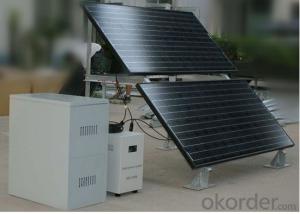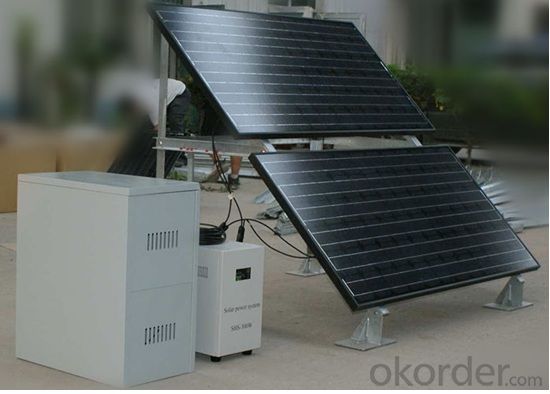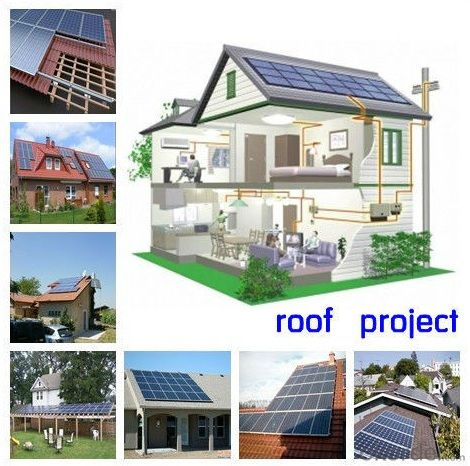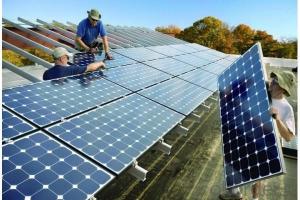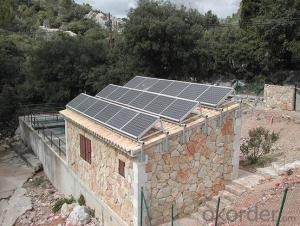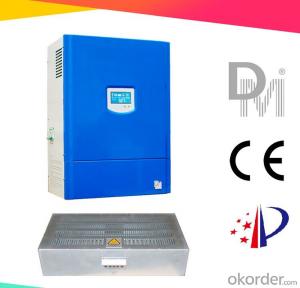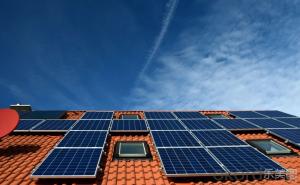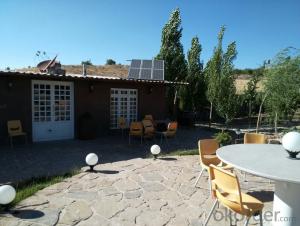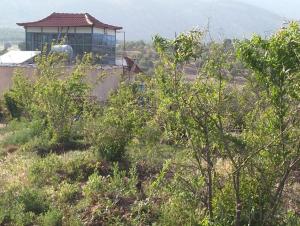Gaia for Solar Energy Systems:Off-Grid Power System/Solar System 2kw New
- Loading Port:
- Shanghai
- Payment Terms:
- TT or LC
- Min Order Qty:
- 2000 watt
- Supply Capability:
- 200000 watt/month
OKorder Service Pledge
OKorder Financial Service
You Might Also Like
| Packaging & Delivery | |
| Packaging Detail: | carton pallet |
| Delivery Detail: | within 7 days |
| Specifications | |
| 2KW Solar Power System | |
| Lifespan >20 years | |
| Designed to meet the needs for low power household appliances | |
| Base on your situaion ,we design the solar power system as following : | |
| 1: PV-system DC voltage level: DC 48V ,ouput AC voltage level: AC220V 50/60HZ | |
| 2: load Working time every day: 840W 5hours(3.5-4.2KW*h/day) | |
| 3: Primise rainy days: 2 days | |
| 4:PV system power Max Input Power: 2KW/DC72V Max AC Output Power: 2000W AC220V 50/60HZ,opration output power:inductive load <=1KW Resistive load:1.6KW | |
| 5: PV Array specification: Voc:DC86.4V Vmp:72V Isc:30A Imp:27.8A | |
Features:
1.Environmental protection
2.Energy-saving products
3.Portable
4.easily use
Advantages:
1.Safety and easy installation,Plug and play systems;
2.Good quality panel to ensure the high efficiency and long life needs;
3.Solar Automatic lighting controller :with adjustable run times, over-current protection;
4.Solar Batteries: Maintenance free, long life batteries
5.Lighting Source: LED lamp /Lantern (Fixed/Movable)
7.Flexible designs per client requests;
Using of scope:
It is very good for indoor use where there is shortage of electricity and for outdoor activities such as picnicking, fishing and camping. It is an ideal tool for Motor Mechanics, Farm House and small shop owners such as Hairdressers, Barbers, Cobblers, Tailors and Kiosk keepers.
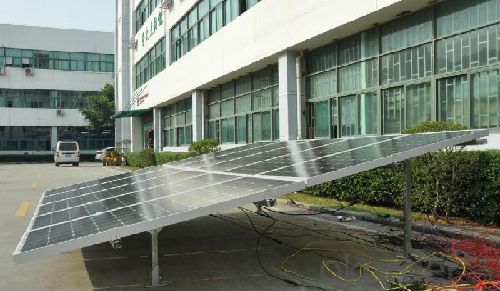
| Name | Type | Number | Remarks |
| MONO-Solar panel | JX200M/36V 1580*808*35mm | 10 | 2KW connection: 2 Series, 5 In parallel |
| Battery | 12V200Ah | 8 | Gel batteries The total capacity:DC48V/400Ah |
| PV-inverter | JX-2KW | 1 | inputDC48V -outputAC220V 50/60HZ,city power automatic switch |
| PV support | JX-S200-10 | 1 | 10 Pcs solar panels use a PV support , Material: Hot -dip galvanized |
| Battery box | JX-C24 | 1 | size:780*800*900mm 4layerdetachable type |
| PV Controller | CM4860 | 1 | DC48V 60A , RS485 communication function |
| PV cable,connect bettwen | PV-1*4.0mm2 | 100 | PV -specific single-core copper 4.0 mm2 cable,Double protection cover 100M |
| Power cable | BVV-1*16mm2 | 50 | single-core copper 16 mm2 cable,Double protection cover |
FAQ
We have organized several common questions for our clients,may help you sincerely:
①what price for each watt?
it depends on the quantity, delivery date and payment terms,
②what is your size for each module? can you tell me the parameter of your module?
we have different series of panels in different output, both c-si and a-si. please take the specification sheet for your reference.
③Can you provide the peripheral products of the solar panels, such as the battery, controller, and inverter? If so, can you tell me how do they match each other?
Yes, we can, we have two companies for solar region, one is CNBM International, the other is CNBM engineering Co.
We can provide you not only the solar module but also Solar Cells, the off grid solar system, we can also provide you service with on grid plant.
④What is your warranty system?
Our product performance guarantees for 25 years
• 12 years guarantee for workmanship
• Timeliness of delivery
• Quality Products certified (TÜV, UL, CE, ISO)
⑤How do you pack your products?
We have rich experience on how to pack the panels to make sure the safety on shipment when it arrives at the destination.
⑥ Can you do OEM for us?
Yes, we can.
⑦How long can we receive the product after purchase?
In the purchase of product within three working days, We will arrange the factory delivery as soon as possible. The pecific time of receiving is related to the state and position of customers. Commonly 7 to 10 working days can be served.
- Q: Can solar energy systems be used for powering electric vehicle solar charging stations at highways?
- Yes, solar energy systems can certainly be used to power electric vehicle (EV) solar charging stations at highways. Solar power is a clean and renewable energy source that can be harnessed through photovoltaic (PV) panels. These panels convert sunlight into electricity, which can then be used to charge EVs. Highways are often exposed to ample sunlight, making them ideal locations for solar charging stations. By utilizing solar energy, these charging stations can operate off-grid, reducing dependence on traditional power sources and minimizing environmental impact. Additionally, solar charging stations can be installed along highways without the need for extensive infrastructure development, as they do not require connection to the electrical grid. Solar-powered EV charging stations offer several benefits. First, they provide a sustainable and carbon-free method of charging EVs, helping to reduce greenhouse gas emissions and combat climate change. Second, they contribute to the development of a decentralized energy system, as they are independent of the electrical grid. This decentralization can enhance energy security and resilience, as well as increase the overall reliability of the charging infrastructure. Moreover, solar charging stations can have economic advantages. As the cost of solar panels continues to decrease and the efficiency of PV technology improves, the installation and maintenance costs of solar charging stations are becoming increasingly competitive with traditional charging infrastructure. Furthermore, solar charging stations can generate additional revenue through excess energy production, as any surplus electricity can be sold back to the grid. In conclusion, solar energy systems are a viable and sustainable solution for powering electric vehicle solar charging stations at highways. They offer environmental benefits, promote energy independence, and can contribute to cost savings. As the adoption of EVs continues to grow, the integration of solar energy into the charging infrastructure will play a crucial role in creating a greener and more sustainable transportation system.
- Q: Can solar energy systems be used in areas with high altitude?
- Yes, solar energy systems can be used in areas with high altitude. In fact, solar panels can be even more effective in higher altitudes due to the reduced air density, which allows for more direct sunlight to reach the panels. However, it is important to consider the potential challenges such as extreme temperature variations and harsh weather conditions that can impact the efficiency and durability of solar energy systems in high-altitude areas.
- Q: Can solar panels be installed on uneven or sloped surfaces?
- Yes, solar panels can be installed on uneven or sloped surfaces. However, the angle and orientation of the panels may need to be adjusted to optimize sunlight exposure and maximize energy production. Mounting systems, such as adjustable racks or ballasted mounts, can be used to ensure proper installation and stability on such surfaces.
- Q: What are the advantages of using solar energy systems?
- There are several advantages of using solar energy systems. Firstly, solar energy is a renewable and abundant source of energy. It is derived directly from the sun, which means it will never run out. Secondly, solar energy systems are environmentally friendly as they produce zero greenhouse gas emissions during operation, reducing our carbon footprint and combating climate change. Additionally, solar energy systems require minimal maintenance, resulting in lower operating costs compared to traditional energy sources. Moreover, installing solar panels on rooftops can help households and businesses save money on their electricity bills by generating their own clean and free energy. Finally, solar energy systems can provide energy independence, reducing reliance on fossil fuels and the risks associated with fluctuating energy prices.
- Q: Can solar energy systems be used for wastewater treatment?
- Yes, solar energy systems can be used for wastewater treatment. Solar energy can power various components of a wastewater treatment system, such as pumps, aerators, and disinfection units, reducing or eliminating the need for grid electricity. Solar-powered wastewater treatment systems are not only environmentally friendly but also cost-effective, making them a sustainable solution for remote or off-grid areas where traditional infrastructure is not readily available.
- Q: How does the angle of incidence affect the performance of solar panels?
- The angle of incidence significantly affects the performance of solar panels. When the angle of incidence is perpendicular to the sun's rays (90 degrees), the panels receive the maximum amount of solar energy, resulting in the highest efficiency. As the angle deviates from perpendicular, the amount of energy captured decreases, leading to reduced performance. Therefore, adjusting the angle of solar panels to match the sun's position throughout the day optimizes their efficiency and overall performance.
- Q: Can solar energy systems be used for lighting outdoor spaces?
- Yes, solar energy systems can be used for lighting outdoor spaces. Solar lighting systems typically consist of solar panels, batteries, and LED lights. The solar panels collect sunlight and convert it into electricity, which is stored in the batteries. The LED lights are then powered by the stored electricity and provide illumination for outdoor spaces such as gardens, pathways, patios, or parks. Solar-powered outdoor lighting systems have several advantages. First, they are environmentally friendly as they do not produce any greenhouse gas emissions during operation. Additionally, they do not require any external power source, making them independent of the electrical grid. This makes them particularly suitable for remote or off-grid locations where connecting to the grid may be difficult or costly. Solar outdoor lighting systems are also cost-effective in the long run. While the initial installation cost may be higher compared to traditional lighting systems, there are no monthly electricity bills associated with solar lighting. Furthermore, solar lighting systems have low maintenance requirements, as the solar panels and batteries are designed to withstand various weather conditions. Another benefit of solar lighting systems is their flexibility and ease of installation. Since they do not require underground wiring or electrical connections, they can be easily installed in any outdoor space. This makes them ideal for temporary or seasonal lighting needs, as they can be easily moved or repositioned. In conclusion, solar energy systems can indeed be used for lighting outdoor spaces. They offer numerous benefits such as environmental sustainability, cost-effectiveness, low maintenance, and easy installation. Solar lighting systems are a practical and reliable solution for illuminating outdoor areas while minimizing energy consumption and reducing carbon footprint.
- Q: Can solar energy systems be installed in urban areas with limited space?
- Solar energy systems can indeed be installed in urban areas with limited space. Despite the fact that urban areas often have limited rooftop space for solar panel installation, there are several creative solutions that can be used to overcome this challenge. One option is to install solar panels on vertical surfaces like walls or building facades. This approach makes the most of the available space and doesn't require additional land. By utilizing vertical space, solar energy systems can still generate a significant amount of electricity even in densely populated urban areas. Another solution is to implement community solar projects. These projects involve installing solar panels in a centralized location within the urban area, such as a parking lot or vacant lot. The electricity generated by these panels can then be shared among multiple buildings or households, allowing those with limited rooftop space to still benefit from solar energy. Furthermore, advancements in technology have resulted in the development of more efficient and compact solar panels. These panels can generate the same amount of electricity as traditional panels with less surface area, making them more suitable for installation in limited urban spaces. In addition to these solutions, it's important to consider the potential of integrating solar energy systems into existing infrastructure. For instance, solar panels can be installed on top of bus stops, streetlights, or even on the sides of bridges and highways. This allows for the utilization of spaces that would otherwise go unused. In conclusion, although limited space can be a challenge, there are various ways to install solar energy systems in urban areas. With innovative approaches and technological advancements, solar power can be harnessed even in densely populated cities, contributing to a more sustainable and renewable energy future.
- Q: Can solar energy systems be used for powering agricultural drying or processing operations?
- Yes, solar energy systems can definitely be used for powering agricultural drying or processing operations. Solar energy is a clean and renewable source of power that can be harnessed and utilized to meet the energy needs of various agricultural activities. Solar drying systems can be employed for drying crops, grains, fruits, vegetables, and other agricultural produce. These systems use solar radiation to generate heat, which is then used to dry the agricultural products. Solar dryers are cost-effective, energy-efficient, and have lower operational costs compared to traditional drying methods. They can be particularly useful in regions with abundant sunlight and limited access to electricity. Solar energy can also be used to power various processing operations in agriculture. Solar-powered mills, crushers, pumps, and other machinery can be used for tasks such as milling grains, crushing fruits, or pumping water for irrigation. By utilizing solar energy, farmers can reduce their dependence on fossil fuels and electricity from the grid, leading to cost savings and a more sustainable farming practice. Furthermore, solar energy systems can be combined with energy storage solutions, such as batteries, to ensure a continuous power supply even during periods of low sunlight or at night. This allows farmers to have reliable access to energy for their drying or processing operations throughout the day. Overall, solar energy systems offer a viable and environmentally friendly solution for powering agricultural drying or processing operations. They can contribute to reducing greenhouse gas emissions, decreasing reliance on fossil fuels, and promoting sustainable farming practices.
- Q: Are solar energy systems reliable?
- Yes, solar energy systems are reliable. They have proven to be a dependable and consistent source of renewable energy, with technology advancements and improved efficiency over the years. Solar panels have a long lifespan, with minimal maintenance requirements, making them a reliable investment for generating electricity from the sun.
Send your message to us
Gaia for Solar Energy Systems:Off-Grid Power System/Solar System 2kw New
- Loading Port:
- Shanghai
- Payment Terms:
- TT or LC
- Min Order Qty:
- 2000 watt
- Supply Capability:
- 200000 watt/month
OKorder Service Pledge
OKorder Financial Service
Similar products
Hot products
Hot Searches
Related keywords
